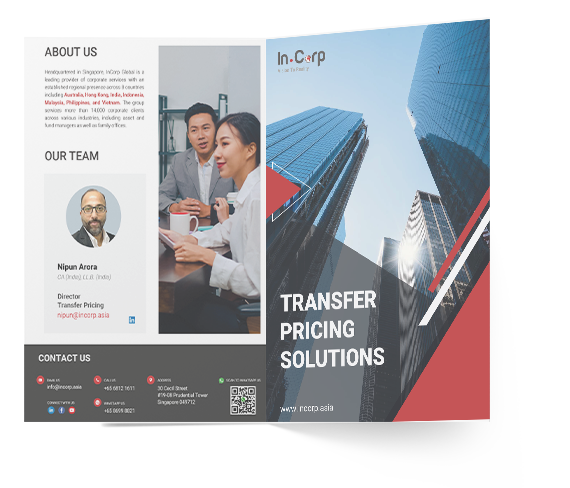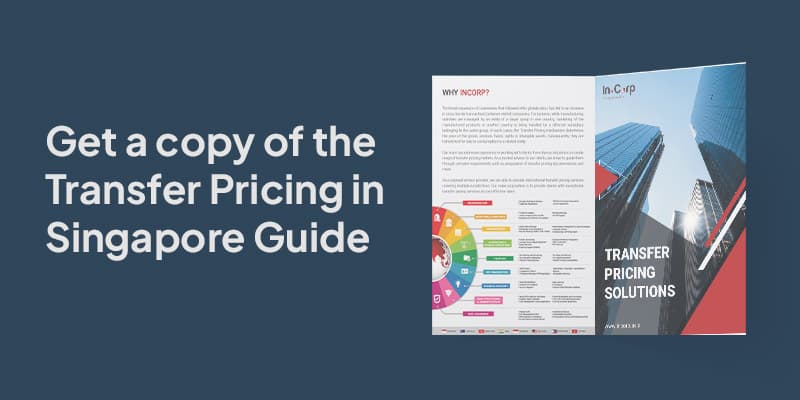Singapore Transfer Pricing Services
We partner with you in decoding the ever-evolving transfer pricing environment to mitigate transfer pricing-related tax risks.
Get In Touch With Our Transfer Pricing Experts
What is Transfer Pricing in Singapore?
Transfer pricing determines the price of the goods, services, funds, rights, or intangible assets that are thus transferred for sale or consumption between related parties. such as subsidiaries of the same multinational corporation. The documentation for transfer pricing in Singapore is mandatory under the Income Tax Act Section 34F.
The realm of transfer pricing has become increasingly intricate, primarily because of factors like the expansion of international trade, alterations in local regulations, and economic instability. To comply with tax authorities and regulations, taxpayers must maintain up-to-date documentation demonstrating that their transactions with related entities are conducted at fair market values. Such price is known as the ‘arm’s length price’.
Our Singapore Transfer Pricing Services:
Singapore Transfer Pricing Documentation
- Review the existing Transfer Pricing policies and the supporting Transfer Pricing Documentation being maintained by the multinational group
- Suggest improvements to the existing Transfer Pricing policy keeping in view the local rules and regulations/ OECD Guidelines/ BEPS
- Preparation of mandatory Transfer Pricing Documentation as per Second Schedule of Income Tax (Transfer Pricing Documentation) Rules, 2018
- Preparation of Transfer Pricing Documentation for commodity marketing and trading entities based on the First Edition of the e-tax guide on ‘Transfer Pricing Guidelines: Special Topic – Commodity Marketing and Trading Activities’
- Preparation of Group Master File
- Country-by-Country Reporting (‘CbCR’)
Transfer Pricing Audit Defense
- Preparation of comprehensive response to the audit questionnaire issued by the IRAS
- Conduct risk profiling vis-à-vis potential outcomes
- Continuous discussion with the key stakeholders regarding the resolution strategies
- Meeting the Revenue Officer, if called upon to explain the facts of the case and present the Transfer Pricing methods and positions adopted for related party pricing
- Assist with the field visit by the Revenue Officers
- Assist with filing the follow-up response upon field visit
- Assist with the conclusion of audit proceedings and suggest the way forward
Transfer Pricing Advisory
- Advising the supply chain structure that is tax-efficient and in accordance with the Transfer Pricing rules and principles
- Review of intercompany agreements to ensure that they are drafted in accordance with the generally accepted Transfer Pricing guidelines and supported by appropriate price-setting (arm’s length price) documentation
- Incorporating the Mutual Agreement Procedure article, allowing designated tax authorities from contracting states to resolve tax disputes to a mutual satisfaction.
- Royalty benchmarking (including benefit analysis) to determine an appropriate arm’s length return attributable to the Group entities based on DEMPE (Development, Enhancement, Maintenance, Protection, Exploitation) functions
- Management charges documentation covering the benefits analysis and appropriate cost allocation methodology
- Loan benchmarking to determine the arm’s length interest rate
Who is Exempt From Collating Documentation for Transfer Pricing?
A company or business can be considered exempt from producing pricing documentation under the following conditions:
- If a business or company has a gross annual revenue not exceeding S$10 million for the specified period, they can be exempt from preparing the documentation.
- Companies or businesses that haven’t been requested to produce their documentation by IRAS.
Why should you choose Rikvin as your Transfer Pricing expert?
To ensure that your transactions are conducted in accordance with the arm’s length principle, it is advisable to evaluate them using the transfer pricing analysis methods and to prepare all the required documentation in a timely manner.
With a deep understanding of your company’s data and the economic landscape, we provide guidance with respect to value chain analysis, transfer pricing matters, income tax returns, double taxation, dispute resolution and to ensure compliance for businesses across the Asia Pacific region. Rikvin’s team will collaborate with you to provide clarity and develop a practical global approach tailored to your specific transfer pricing needs, all while ensuring transfer pricing compliance with Singaporean laws.
Backed by over 30 years of industry experience, our dedicated team takes pride in delivering a comprehensive suite of transfer pricing solutions that are customised to meet the diverse requirements of our clients. Our extensive expertise, unwavering commitment, and holistic approach position us as the preferred choice for those in search of a trusted transfer pricing expert in Singapore.
Take control of your international operations and optimise your tax position with our transfer pricing expertise
Frequently Asked Questions About Transfer Pricing
- In 2018, the IRAS made it mandatory for a Singapore Company to arrange prepare Transfer Pricing Documentation. As such, a new section i.e. Section 34F was inserted in the Income Tax Act and is applicable from the year of assessment 2019 and every subsequent year of assessment.
- Contemporaneous Transfer Pricing Documentation refers to documentation and information that taxpayers have relied upon to determine the transfer prices of a related party transaction, prior to or at the time of undertaking the transactions with related parties.The IRAS also accepts Transfer Pricing Documentation as contemporaneous when it has been prepared not later than the due date of filing of the annual tax return for the financial year in which the transactions took place.
- Transfer Pricing Documentation has to be place before the due date for filing the annual tax return.
- The principle of transfer pricing states that the amount charged by one related party to another for a given product must be the same as if the parties were not related. An arm’s-length price for a transaction is therefore what the price of that transaction would be on the open market. The ALP can also be determined in advance through the advance pricing agreement (APA) formed between tax authorities and a taxpayer.
- The mutual agreement procedure provision resolves disputes like double taxation in a compliant manner by bringing the parties involved to a mutual settlement or agreement. This provision is applicable for a resident of Singapore who is a taxpayer or a non-resident taxpayer who has Singapore branch and pays taxes where they are a resident and have a DTA (double taxation agreement)
Client Success Stories
Our experience of Rikvin has been excellent. Team Rikvin provided exceptionally professional and timely advice in the process of setting up my law practice, including handling all aspects of incorporation, accounting, tax and compliance, and HR issues.”
Abraham Vergis, Managing Director,
Providence Law Asia LLC
We got a referral from several business partners and our experience so far has been excellent. We have consulted several incorporation service providers but none has matched the promptness and service level we received from Rikvin.”
Juliana Bernard-Brunel, Director,
Simpleshow Asia Pte Ltd
Featured Transfer Pricing Guides









